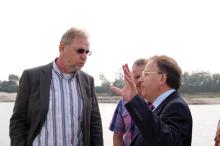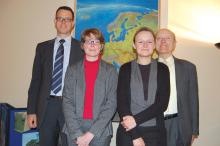
Recent International UEPG visits will strengthen the recognition and lobbying power of the Aggregates Industy globally, while many of its activities are also seen as examples to be implemented globally.
The
The three countries have the same challenges of access to local aggregates resources in the major cities, and all three associations decided to emulate the UEPG lobbying strategy on the RMS and to initiate national aggregates strategies similar to those adopted in the European Union (for example the Finnish Strategy or the French Livre Blanc).
Indeed, the universal need for access to local resources can now reinforce UEPG's lobbying at home.
NEW ZEALAND
Jim O'Brien, invited by Roger Parton, executive director of the Aggregate and Quarry Association of New Zealand (AQA), made a keynote presentation (Key Challenges of the European Aggregates Industry as Opportunities for New Zealand) at the AQA/IOQ annual conference in Rotorua. Although the New Zealand aggregates production has declined since 2007, it now is an impressive 7.6 tonnes per capita, and the economy is set to grow steadily in the years ahead while facing the challenges of rebuilding after the Canterbury and Christchurch earthquakes.
AUSTRALIA
In Australia, he was welcomed by Ken Slattery, CEO of Cement, Concrete & Aggregates Australia (CCAA) at its Sydney office, and gave a series of presentations on Key Challenges of the European Aggregates Industry - Opportunities for Australia to key senior state minerals planning and environmental officials and local industry representatives in Sydney, Melbourne and Brisbane.
The Australian economy is strong, with a national aggregates demand of 6.3 tonnes per capita, demand being particularly strong in the major cities, with the additional challenge of reconstruction after the floods in Queensland. CCAA is particularly focused on future aggregate supplies in the big urban areas.
COLOMBIA
The Colombian visit, organised by Carlos Fernando Forero of ASOGRAVAS, involved a keynote presentation on Recycling of Construction and Demolition Materials - the European Perspective at a major recycling conference in Bogotá. Presentations were also made in Medellín and Cartagena on Future Opportunities for the Colombian Aggregates Industry to senior government officials, planners, architects and industry representatives..
Although national demand is currently only 3 tonnes per capita, the strong economic growth promises an increase to 5 tonnes per capita within 5 years.
During the visits there was also interest in resource efficiency and recycling, and strongest in their commitments to promote this were the burgeoning cities of Bogotá and Medellín where the combined pressures of the high cost of natural aggregates (2-3 times that of the EU average); availability of demolition materials and lack of landfill space have triggered government demands to use recycled materials in new buildings. Their experiences can also be adopted by EPRA to promote more recycling in EU countries, and the organisation will also benefit from the best practice recycling guide in preparation by Alan Kirby of the Cement & Concrete Association of New Zealand. .
All three countries noted the UEPG commitment to biodiversity, and the many case studies which prove that quarrying and biodiversity are fully compatible: they face similar challenges of access, which is prohibited or extremely difficult in conservation areas. The EC Natura 2000 Guidelines as well as national biodiversity good practice guidelines were seen as useful models to adopt.
On health and safety there was strong interest in the Safer by Design project, which will reduce injuries and ill-health attributable to poor mobile plant design. In Australia, the parallel EMESRT initiative in the mining industry is now deemed to be a significant success.
There was also great interest in the universal challenge of improving industry safety, with the CSI (
UEPG's activities on public relations were noted in all three countries, with the UEPG and national campaign examples favoured for adoption while the UEPG's Sustainable Development Awards were seen as a great example to follow.
It was very gratifying to see that so many of UEPG activities are seen to be examples to be implemented globally, and it will also benefit from learning from the good practices its colleagues in GAIN (the Global Aggregates Information Network).
Overall such exchanges will strengthen the recognition and lobbying power of the aggregates industry globally.







